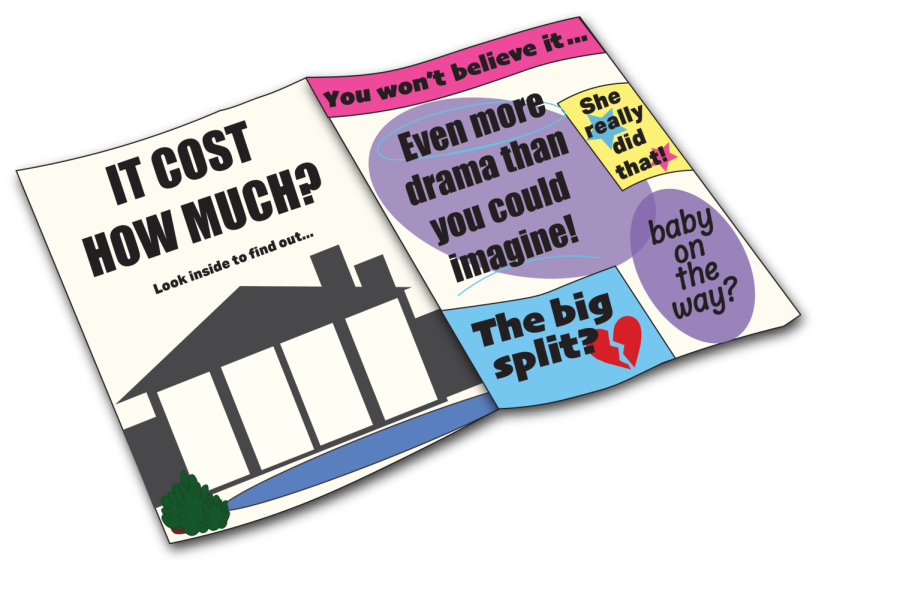Op-ed: Entertainment ‘news’ needs to mitigate celebrity coverage
March 20, 2023
Public obsession with the intimate details of celebrities’ lives is a tale as old as time. We have an untamable desire to know who Pete Davidson is dating, how much money Jimmy Fallon’s home is worth and exactly how Demi Lovato has been navigating their addiction issues.
Various mainstream organizations are guilty of propagating that obsession, even excluding the ill-intentioned tabloids masquerading as legitimate news sources, such as the National Enquirer and The Sun. Stories are plastered across front pages and social media, treated like breaking news.
Access Hollywood recently published a series of photos of Avril Lavigne with Tyga, her rumored new boyfriend. BuzzFeed News is currently featuring an article titled, “Justin Bieber Literally Couldn’t Have Had Less Of A Reaction To Hailey Bieber Being Trolled…” I recently took an early-morning Uber ride to the sound of radio hosts ranting about Tiger Woods and Erica Herman, his ex-girlfriend, for a solid 10 minutes. Are these really the need-to-know headlines?
News organizations cannot deny their power. Their journalistic expertise deems and validates what stories we consume. But often our attention is diverted from more pressing issues. It’s easy to see why people would rather focus on Us Weekly’s timeline of Megan Fox and Brian Austin Green’s relationship than President Joe Biden’s new budget, but that should not be exploited.
Most entertainment news is comparatively unimportant. But even within entertainment news, there are better stories. For example, it is important to know when Ye, better known as Kanye West, makes antisemitic comments on Twitter or when Ashton Kutcher and Mila Kunis raise money for humanitarian aid efforts in Ukraine. Coverage of more irrelevant stories takes our attention away.
Remember one of last year’s “biggest” stories? Released in 2022, “Don’t Worry Darling” is a psychological thriller starring Florence Pugh and Harry Styles, among other famous actors. In the days building up to the movie premiere, there was extensive drama surrounding the cast and entertainment news organizations leaped to exploit it. From a rumored relationship between Styles and director Olivia Wilde, an apparent feud between Pugh and Wilde and a press conference where Styles allegedly spit on costar Chris Pine, there was always another irrelevant controversy.
We were more tuned into the drama rather than the merits of the movie. For example, the movie had a rare female director at the helm, Pugh gave an incredible performance and the story tackled important themes. But those stories rarely, if ever, made it into popular discourse.
Can some of these entertainment news organizations even be considered news organizations? News organizations cover relevant stories. But most celebrity news do not change our day to day lives. Our lives will not be impacted by Austin Kevitch’s relationship with Camilla Cabello, what Blake Lively wears on a walk or whether or not Kendall Jenner kissed Bad Bunny. Consequently, I hesitate to consider these as news stories.
During the 2023 Grammy Awards earlier this year, it was hard to find general coverage of the night that simply celebrated the joy of music and the night’s winners. There were, however, plenty of stories about Adele allegedly walking out after Styles won Album of the Year as well as several articles aggregating social media reactions to Beyoncé losing the same award.
Everyone can have their own opinions about what went down. Nevertheless, I found it sad to see the consequences of excessive coverage and social media spiraling. I vividly remember opening up Twitter to see the Grammy’s drama trending higher than the earthquake that killed an initial 3,700 people in Turkey the same day. That’s what we chose to focus on? Really?
Of course, social media has made the situation much, much worse. Not only do news organizations excessively push their stories across several channels, but the added exposure given to irrelevant stories leads to intense negative reactions. Just take a look at any of the comments under posts on accounts like BuzzFeed Celeb or Entertainment Tonight.
Even worse, social media outrage sometimes makes it off the internet.
Recently, there has been some alleged drama between Justin Bieber, Hailey Bieber and Selena Gomez. I don’t fully understand the details, but luckily, Forbes did a rundown of this incredibly relevant story. Justin Bieber then performed at the Rolling Loud music festival in Los Angeles, and fans began screaming insults against his wife.
I understand this is, unfortunately, common fan behavior and definitely not the first time fans have publicly targeted celebrities with no regard for their mental health or privacy. Many of us have stopped treating celebrities like human beings deserving of respect. But I would be willing to bet the public response could have been mitigated had the media not validated the story and made it a scandal. You are less likely to be outraged about something you did not know about in the first place and that is why the media ecosystem remains guilty.
The mitigation of entertainment news coverage is a nuanced topic that certainly cannot be dissected in a 900-word opinion piece by a college student. There are several arguments I barely touched, such as how disrespectful the coverage is, how some celebrities themselves incite news coverage or how the public bears responsibility in avoiding consuming celebrity news. But the influence of news organizations in their reporting choices cannot be ignored.
Pavithra Rajesh is a fourth-year journalism major. She can be reached at rajesh.p@northeastern.edu.







